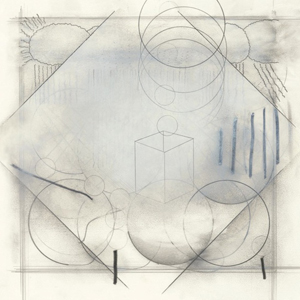Actress Ghettoville
To his credit, Darren Cunningham has remained a truly uncompromising and incomparable artist since introducing […]

To his credit, Darren Cunningham has remained a truly uncompromising and incomparable artist since introducing the world to his Actress moniker in 2004. His vision of what dance music can (or, perhaps, should) be consistently toes the fringe of genre expectations, setting trends in the world of house and techno as much as it bucks them entirely. So it’s no surprise that Ghettoville, Cunningham’s fourth full-length album, hardly sounds like anything previously released by Actress. His project has always been one of exploration and experimentation, but with its gaze locked on the dancefloor more often than not, helping to lend the music an air of levity despite being so cerebral. However, levity is a characteristic that Ghettoville conspicuously lacks. And in the absence of those hedonist inclinations, Actress colors in his dense, hour-plus-long LP with opaque smears of rhythm, sooty atmospheres, and decaying memories of pop music.
There is decidedly little joy or beauty to be found in Ghettoville. Cunningham has explained as much, telling Pitchfork, “I wanted this record to sound brittle, as if you were an addict and you feel like the world is crumbling around you.” But as the spiritual “sequel” to Hazyville (a lively and, on occasion, downright playful record) and the actual successor of R.I.P‘s delicate mysticism, Ghettoville‘s lack of lightness lingers over it like a thick plume of smoke, dirtying and sometimes even choking its music.
Lead track “Forgiven” sets the tone with a seven-and-a-half-minute meditation on a loop of a detuned guitar pitched down into oblivion, with a slow and simple beat carrying the instrument’s death rattle through the muck. Tempos only pick up marginally in the album’s top section—when Cunningham plays around with sleazy hip-hop on “Corner” and teases at dopey dance music on Quaaludes with “Rims”—before returning to the same kind of ultra-slow dirge that opened it. Like “Forgiven,” “Contagious” is essentially a destroyed version of instrumental hip-hop made to resemble a long, ominous drone. It’s a novel enough idea that works well within the seedy conceptual landscape of Ghettoville, but not necessarily one that needs to be revisited multiple times and at such indulgent lengths.
Following the oily wallop of his first five tracks (which surprisingly account for nearly half of the record’s runtime), Actress lets Ghettoville open up a bit to allow some dim slivers of light through the haze. “Birdcage” signals a drastic change in mood with its stomping and relatively quick-footed house beat, working out a funky, percussive groove with a focused economy of sounds. It’s easily the most fun Cunningham has on the album (there’s even a spritely flute melody in the mix), and comes almost like a gasp of oxygen after being submerged under Ghettoville‘s swampiest region. Things stay above the surface for sometime, as the astral “Our,” the bewitching “Time,” and the borderline rave-ready “Gaze” give the extensive tracklist some of its brightest and most vital moments. But these songs are foreigners marooned in Ghettoville‘s mutant underbelly, as Actress seems to have let his fixation on “the darkness of human nature” and that element’s bastardized kind of electronic music run amok without considering the potential consequence of leaving a beleaguered audience in his wake.
Somewhere amidst the bog of gritty detritus that surrounds Ghettoville exists an engaging experimental album in line with the lineage of Cunningham’s otherwise untouchable discography. Be it because of his current creative headspace or the implications of the record’s overall theme, the 15 tracks on offer feel scattershot and, in a couple of rare instances, insubstantial, even when they go on for twice as long as they should. An artist like Actress will always have a vision that reaches beyond the tropes and mores of contemporary music (though, industrial-leaning techno cuts like “Street Corp” and “Frontline” resonate on the same trendy frequency of the L.I.E.S. label and its ilk), but the downfall of such lofty intentions is occasionally overshooting the mark. And though his misses may make Ghettoville appear lopsided and drab, every on-point production buried in the heap makes mucking through Cunningham’s warped ideas rewarding work.

